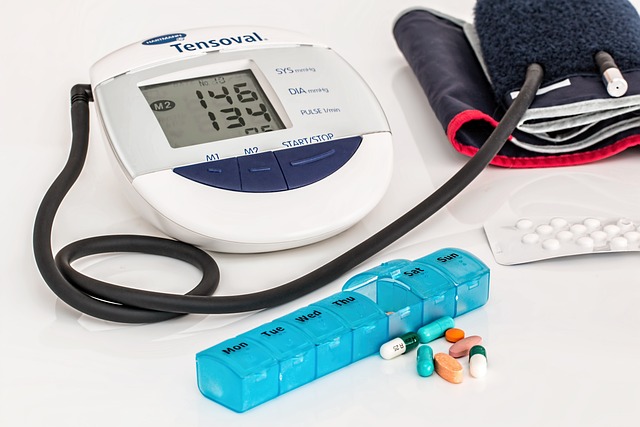Adopt a balanced diet rich in whole foods, engage in regular exercise and hydration, practice mindfulness, get quality sleep, and plan healthy meals with mindful portion control to achieve a healthier lifestyle. Avoid processed foods for long-term well-being, focusing on nutrient-rich alternatives for enhanced overall health.
“Unleash your inner health champion! Discover simple yet powerful strategies to transform your daily routine. From balanced diet advice and regular exercise routines to staying hydrated tips and effective stress management, we’ve got you covered. Learn how to fuel your body right with diverse, nutrient-rich foods and practice mindful eating for optimal portion control. Embrace movement, hydration, and mindfulness for a holistic approach to wellness. Say goodbye to processed food and hello to a vibrant, healthier you!”
- Balanced Diet Advice: Fueling Your Body Right
- – Understanding the foundation of a healthy diet
- – Incorporating diverse nutrient-rich foods
- – Tips for mindful eating and portion control
Balanced Diet Advice: Fueling Your Body Right

Adopting a balanced diet is a cornerstone of any successful strategy to enhance your daily health habits. Focus on incorporating diverse whole foods like fruits, vegetables, lean proteins, and whole grains into your meals. This approach ensures your body receives an array of essential vitamins, minerals, and fiber, promoting optimal overall well-being.
To optimize your diet, consider implementing regular meal planning and portion control strategies. Prepare balanced meals that include a variety of food groups, ensuring each meal provides adequate protein, carbohydrates, and healthy fats. Additionally, stay mindful of your fluid intake by prioritizing staying hydrated throughout the day. Avoid processed foods, opting instead for fresh or minimally processed alternatives to reduce sugar, unhealthy fats, and added chemicals.
– Understanding the foundation of a healthy diet

A healthy diet is a cornerstone of any robust strategy to improve daily health habits. It’s not about restrictive diets or fleeting trends but rather about cultivating a balanced approach that nourishes both your body and mind. Balanced diet advice includes incorporating a variety of whole foods such as fruits, vegetables, lean proteins, and whole grains. These foods provide essential nutrients and support overall well-being. One key tip for a healthier lifestyle is to focus on portion control – eating until you’re satisfied, not stuffed. Regular exercise routines complement dietary changes by promoting physical fitness and mental clarity. Staying hydrated tips emphasize the importance of adequate water intake, crucial for optimal bodily functions.
Complementing these practices with effective stress management and mindfulness practices can further enhance your health journey. Quality sleep tips remind us that rest is not a luxury but a necessity for repairing and rejuvenating our bodies. By avoiding processed food, you minimize exposure to added sugars, unhealthy fats, and preservatives, opting instead for real foods that support long-term vitality. Healthy meal planning plays a significant role in achieving these goals, allowing you to prepare nutritious meals ahead of time, thus saving time and making healthier choices easier.
– Incorporating diverse nutrient-rich foods

Adopting a diverse and nutrient-rich diet is one of the cornerstones of a healthier lifestyle. Incorporating a variety of fruits, vegetables, whole grains, lean proteins, and healthy fats ensures your body receives a wide range of vitamins, minerals, and essential nutrients. Balanced diet advice suggests filling half your plate with vegetables and dividing the rest between protein and whole grains. This not only supports overall health but also helps in maintaining regular exercise routines by providing the energy and fuel needed to stay active throughout the day.
Moreover, staying hydrated is another key tip for a healthier lifestyle. Drinking plenty of water supports effective stress management and mindfulness practices, as it can help reduce feelings of fatigue and improve mood. Quality sleep tips encourage aiming for 7-9 hours nightly, as adequate rest is essential for repairing and rejuvenating the body. Healthy meal planning and portion control strategies can be implemented by preparing meals in advance and being mindful of serving sizes, which can aid in avoiding processed foods that are often high in sugar, salt, and unhealthy fats.
– Tips for mindful eating and portion control

Incorporating mindful eating habits and practicing portion control are essential tips for a healthier lifestyle. Start by slowing down during meals and paying attention to hunger cues from your body. Enjoy each bite, savoring the flavors and textures, which can help you feel more satisfied with smaller portions. Regular exercise routines complement this practice; physical activity increases energy levels and aids in digestion, making it easier to stick to a balanced diet advice.
Additionally, staying hydrated throughout the day is crucial. Water plays a vital role in digestion and nutrient absorption. Effective stress management techniques like mindfulness practices can also support your health journey. By reducing stress, you may find it easier to make healthier choices, such as preparing meals at home rather than reaching for processed food. Quality sleep tips are also important; adequate rest regulates hormones that control hunger, making it simpler to maintain portion control and avoid unhealthy cravings. Healthy meal planning, considering both nutritional value and variety, ensures your body receives the fuel it needs while reducing the temptation to overeat.
Adopting a healthier lifestyle is a journey that begins with small, manageable steps. By integrating these simple yet effective strategies—from balanced diet advice and regular exercise routines to staying hydrated tips and mindfulness practices—you can gradually transform your habits. Remember, quality sleep and healthy meal planning are also key components. With consistent effort, avoiding processed food and implementing portion control strategies, you’ll be well on your way to a happier, healthier you.
